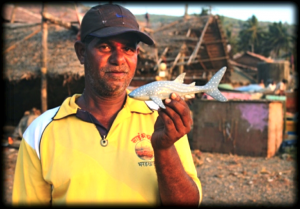Rising to the challenge of whale shark conservation
Location: Mumbai, India. 3rd Jun 2015
The Whale Shark, listed as Vulnerable under the IUCN Red List of Threatened Species, is one of 16 species identified by the Ministry of Environment, Forests and Climate Change (MoEF&CC). Research on the distribution of whale sharks across the west coast of India, was attained through a Small Grant project under the Mangroves for the Future initiative in India; the project was implemented by IUCN Members, Wildlife Trust of India. Whale sharks are found to aggregate in Minicoy (Lakshadweep Islands), Netrani (Karnataka), Malvan (Maharashtra), and Saurashtra (Gujarat). Maharashtra records amongst the highest incidences of incidental catch along the west coast of India; Gill net, Purse-seine and Trawl nets are the primary causes for entanglement. The Forest Department of Maharashtra approached IUCN to work towards a management and conservation plan for the whale shark. The objective was to maintain existing levels of protection for the whale shark in Maharashtra while working to increase the protection, and conservation, afforded to the whale shark within the Indian coastal waters.
Mr. N. Vasudevan (Chief Conservator of Forests, Mangrove Cell, Maharashtra State) noted that this day marked the first in the long-term conservation of whale sharks (and by default other shark species) in Maharashtra, and that “good days are ahead for the whale shark”. Components of the draft action plan for the recovery of whale sharks were deliberated upon by the experts and stakeholders, including habitat and species recovery, research, monitoring and evaluation, and community participation.
This is not the first time an Indian state has taken a proactive stance in conserving the whale shark. The state of Gujarat has made notable achievements in this field. Whale sharks were once targeted catch in Gujarat. The state recorded the maximum landings of 279 sharks in December 1999; 40 whale shark landings were recorded in a single day (September 15, 2001) along the Gujarat Coast. In 2000, the export of 465,000 kg of whale shark meat from Veraval in Gujarat was worth almost INR 218,000. The fishery closed in 2001, when MoEF&CC legally protected whale sharks in territorial waters under Schedule I of the Wildlife Protection Act (1972). The dedicated efforts of Wildlife Trust of India, Tata Chemical Pvt. Ltd., the Gujarat Forest Department and various other partners including International Fund for Animal Welfare (IFAW), has ensured that incidence of death or injury due to targeted or incidental capture of whale sharks is largely prevented. Mr. A. K. Saxena (Principal Chief Conservator of Forests – Head of Forest Force, Maharashtra State) acknowledged that Maharashtra had much to learn from Gujarat, and suggested that a Memorandum of Understanding could be signed for collaborative conservation efforts.
Dr. C.N. Pandey (Principal Chief Conservator of Forests – Head of Forest Force, Gujarat State) credits the public-private partnerships approach, and strong communications strategy, in achieving conservation success in Gujarat. Shri Morari Bapu (a religious leader) climbed on board with an emotional appeal to fishermen, associating the female whale sharks who come to give birth in Gujarat, to Vhali, or the daughter who returns to her parents home for the same reason. Seven cities in Gujarat have now adopted the whale shark as their mascot. 485 whale sharks are recorded to have been released from fishing nets since 2005; the Forest Department has paid more than INR 680,000 in compensation for damaged nets.
Dr. Y. Yadava (Director, Bay of Bengal Programme – Inter-Governmental Organisation) emphasised the need for effective coordination amongst coastal states, and government departments, particularly Forests and Fisheries, for a comprehensive approach towards protection of the species. The plan will be prepared for a 5 year time-period, monitored by an advisory committee of experts and managers.
Dr. N.M. Ishwar (Programme Coordinator, IUCN India Country Office) reiterated IUCN’s commitment towards finalising and implementing the plan through collaborative and scientifically sound approaches.
For more information please contact nisha.d'souza@iucn,org

A fisherman holds up a Whale Shark toy in support of the con ... , Gujarat, India © WTI, 2012